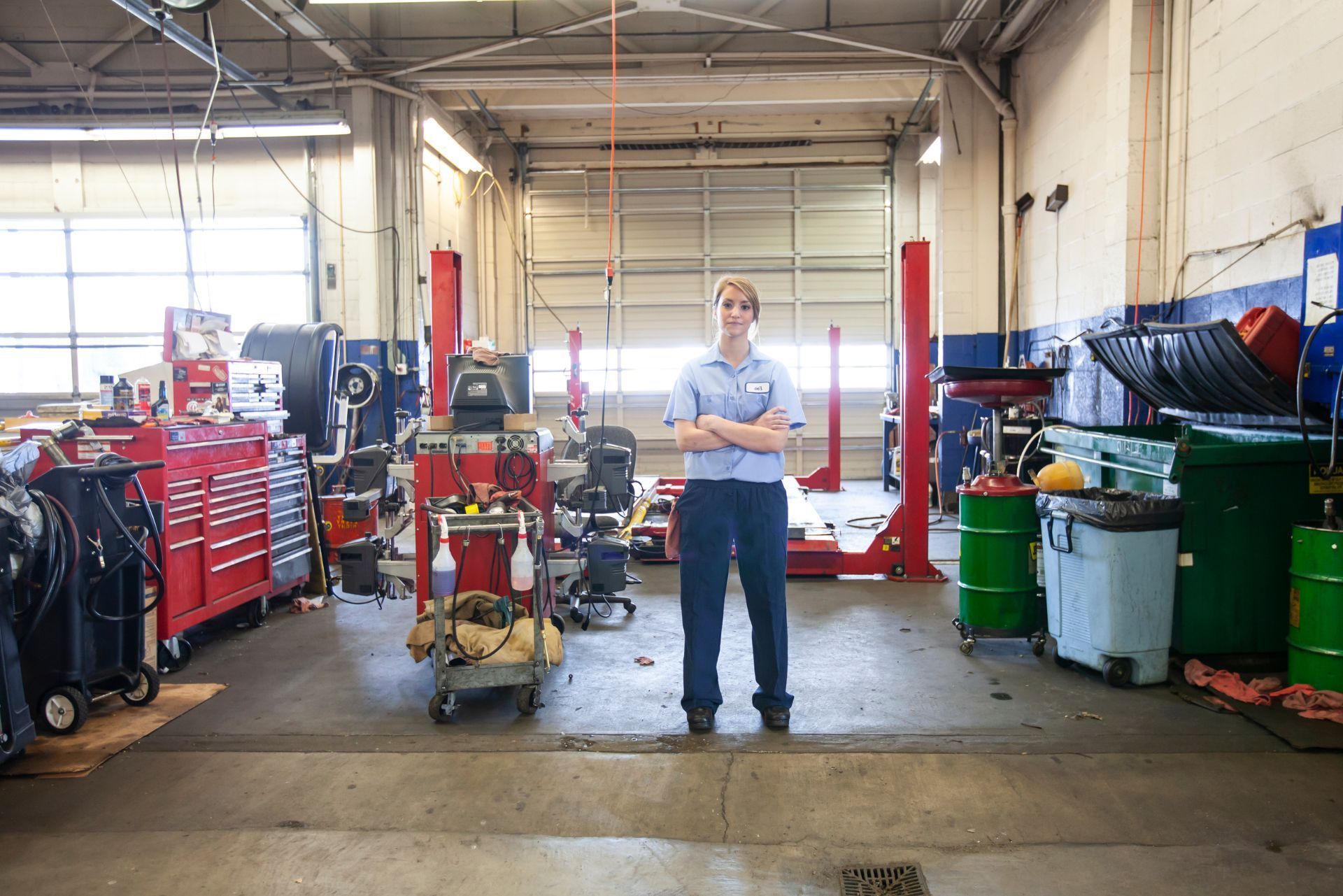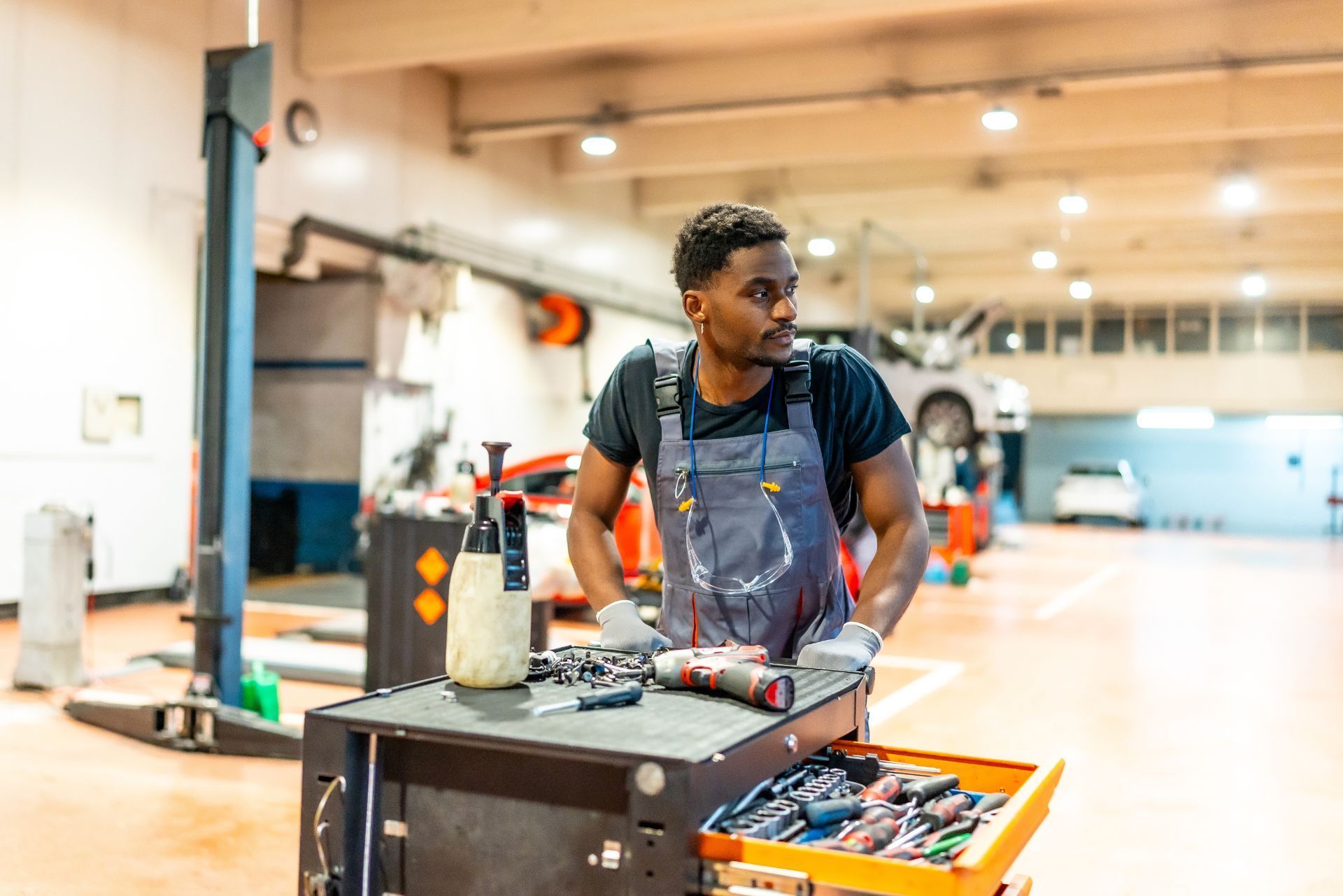Top 3 Recommended Policies

By: Lance Hale
Licensed Commercial Insurance Specialist
425-320-4280
Running a garage repair shop in Washington can be as exhilarating as it is demanding. Every vehicle that rolls into the bay brings potential revenue, but it also carries risk—slippery floors, test drives on crowded interstates, expensive diagnostic tools, and high-value customer cars all create liabilities that can put a shop out of business overnight. Comprehensive insurance coverage is therefore not merely a bureaucratic checkbox; it is the cornerstone of a sustainable operation, shielding owners and employees from financial shocks and ensuring customers can trust the business with their vehicles. This guide highlights the policies required by law, the optional coverages that are rapidly becoming essential, cost factors unique to Washington, and practical steps to select the right insurer. Whether the shop specializes in European sports cars on Seattle’s Queen Anne Hill or farm-truck overhauls in Walla Walla, mastering insurance fundamentals builds the foundation for long-term success.
Why Insurance Matters for Washington Garage Repair Shops
Washington is home to more than 4,600 licensed automotive repair businesses, according to state Department of Revenue data released in 2023. Together these shops employ roughly 27,000 technicians and service writers, generating more than $3.4 billion in annual revenue. Those numbers reflect a thriving sector—but they also highlight significant aggregate exposure. In the past five years, insurers report that bodily injury claims for slips, trips, or falls have averaged $18,900 per incident, while property damage claims stemming from accidental vehicle collisions inside shops have topped $31,000. With profit margins in the industry typically hovering between 10 % and 15 %, a single uncovered claim can erase months of earnings. Insurance serves as a financial backstop that prevents a bad day from turning into bankruptcy.
Risk management carries an additional reputational dimension. In the age of online reviews, a customer whose car is damaged or whose medical bills go unpaid can quickly create a social-media firestorm. Robust insurance not only supplies funds to settle legitimate claims; it also demonstrates professionalism and ethical responsibility. When customers see certificates of insurance prominently displayed—or receive them upon request—they gain confidence that the shop will make things right if something goes wrong. In turn, trust drives repeat business and positive word-of-mouth, giving insured shops a competitive edge.
Legal Requirements in Washington State
Unlike some states, Washington does not impose a single, standalone “garage liability” mandate. Instead, multiple statutes converge to form the minimum legal coverage framework. The most universally triggered law is the Washington Industrial Insurance Act, which obligates employers with one or more employees to carry workers’ compensation insurance through the state-funded system or via approved self-insurance. Penalties for non-compliance include stop-work orders and fines up to twice the amount of premiums owed.
Shops that own or operate tow trucks or courtesy shuttles must comply with the state’s Financial Responsibility Law for motor carriers, which currently requires at least $750,000 of combined single-limit auto liability coverage. Even if a shop does not transport vehicles, any employee who test-drives a customer’s car on public roads triggers standard auto liability obligations, making commercial auto insurance functionally unavoidable.
Environmental regulations add an often-overlooked insurance angle. Washington’s Department of Ecology enforces strict rules on hazardous waste storage, used oil disposal, and air emissions from paint booths. While there is no explicit statutory requirement to buy pollution coverage, failing to maintain financial resources for cleanup can result in orders and civil penalties. Pollution liability insurance is therefore strongly recommended to satisfy regulatory expectations and protect against costly remediation claims.

Core Insurance Policies to Consider
Meeting statutory obligations lays the groundwork, but a best-in-class risk management program extends coverage well beyond the basics. The policies below form the backbone of a comprehensive insurance portfolio for Washington garage repair shops.
General Liability Insurance
General liability (GL) protects the business against third-party bodily injury, property damage, and personal and advertising injury claims. A visiting customer who slips on an oil spot and breaks a wrist or a vendor whose laptop is knocked off a service counter could both file GL claims. Industry benchmarks compiled by the Insurance Services Office show that 39 % of garage-related GL claims involve bodily injury, and the remainder stem from property damage.
Most Washington carriers offer GL limits starting at $1 million per occurrence and $2 million aggregate per policy year, though higher limits are prudent for shops servicing high-value vehicles. Some carriers bundle GL with property and business interruption coverage into a Business Owners Policy (BOP), offering cost savings while streamlining policy administration. However, standard GL excludes damage to customers’ autos in the shop’s care, custody, or control—a critical gap addressed by the next coverage.
Garagekeepers Liability
Garagekeepers liability responds when a customer’s car is damaged by fire, theft, vandalism, collision, or extreme weather while under the shop’s supervision. In Washington’s wet climate, flooding caused by clogged storm drains has emerged as a frequent loss driver, leading to average claim payouts of $14,200. Without garagekeepers insurance, the shop would have to cover these costs out of pocket, often leading to lawsuits or strained customer relations.
Garagekeepers policies are written on either a legal-liability basis—paying only when the shop is legally liable—or on a direct-primary basis, which covers losses regardless of fault and even extends to the customer’s deductible. Direct-primary is more expensive but simplifies claims handling and protects customer goodwill. Deductibles usually range from $500 to $2,500; choosing higher deductibles can lower premiums but should align with the shop’s cash reserves.
Commercial Property Insurance
From alignment racks that cost upward of $60,000 to specialized scan tools loaded with OEM software, the equipment inside a modern garage represents a sizeable investment. Commercial property insurance safeguards buildings, improvements, equipment, inventory, and business personal property against perils such as fire, theft, wind, and vandalism. Washington’s 2020 wildfire season reminded shop owners that even urban locations can suffer smoke damage, prompting many carriers to tighten underwriting guidelines.
Policies can be written on a replacement-cost basis, which covers the cost to repair or replace damaged property without depreciation, or on an actual cash value basis, which deducts for wear and tear. Considering the rapid depreciation of electronic diagnostic tools, replacement-cost coverage is generally worth the additional premium. Business interruption and extra-expense endorsements reimburse lost income if a covered peril forces a shutdown, helping meet payroll and lease obligations during repairs.
Business Auto Insurance
Any vehicle titled in the business name or used primarily for business purposes—whether a service van transporting parts or a shuttle ferrying customers to the nearby light-rail station—requires commercial auto insurance. Policies provide liability, comprehensive, and collision coverage as well as uninsured/underinsured motorist protection. Washington’s Office of the Insurance Commissioner notes that roughly one in five motorists in the state is uninsured, heightening the need for robust UM/UIM limits.
Many garage repair shops mistakenly assume that “non-owned auto” endorsements in their GL policy will cover test-drives. In reality, most non-owned auto coverage is limited and applies only on an excess basis. Carrying a dedicated commercial auto policy with “any auto” or “hired and non-owned auto” provisions aligned to actual operations is the safest approach. Telematics devices and driver-training programs can earn premium credits of up to 10 % for fleets with more than five vehicles.
Workers’ Compensation
Automotive technicians routinely handle sharp metal, corrosive fluids, and heavy components, making workplace injuries more common than in many other industries. According to Washington Labor & Industries (L&I), the average indemnity and medical cost of a lost-time claim in automotive repair reached $49,300 in 2022. State-run workers’ compensation coverage pays medical bills, disability benefits, and a portion of lost wages when employees are injured or become ill in the course of employment.
Premiums are based on job classification codes and total reportable payroll, with modifiers for claims history and participation in safety programs. Enrolling in L&I’s Retrospective Rating program allows well-run shops to earn refunds of up to 40 % if their claims costs come in below expectations. Investing in lift maintenance, personal protective equipment, and regular safety training not only reduces injuries but can directly lower premium rates.
Commercial Umbrella Insurance
Umbrella liability sits atop underlying GL, auto, and employers liability policies, adding an extra layer of protection—often $1 million to $5 million. For shops that service exotic vehicles or maintain high customer traffic, umbrella coverage guards against catastrophic verdicts that could pierce primary policy limits. Premiums are relatively inexpensive compared with the security they provide, typically running $500 to $1,200 per million of coverage.
Cyber Liability Insurance
Diagnostic platforms increasingly connect to OEM servers, and point-of-sale systems store credit-card data subject to Washington’s stringent data breach notification law. Cyber liability policies cover the cost of forensic investigations, customer notification, credit monitoring, and potential regulatory fines. Although average premiums remain modest—often under $1,000 annually for $1 million in limits—uninsured data breaches can top six figures, making this an emerging must-have for modern repair shops.
Cost Factors: What Influences Your Premium in Washington
Insurance carriers weigh a mix of business characteristics when pricing policies. Location is paramount; shops in King County, where property values and traffic density are high, generally pay more than counterparts in Chelan or Franklin counties. Claims history carries heavy weight as well—three or more GL or garagekeepers claims within five years can boost premiums by 20 % to 30 %. Conversely, a clean loss run often qualifies a shop for preferred-tier rates.
Operational details such as hours of service, number of bays, employee training levels, and security measures (alarm systems, CCTV, fire suppression) also shape the underwriting outcome. Finally, coverage selections—such as opting for direct-primary garagekeepers coverage or a lower deductible—inevitably affect cost. On average, a mid-sized Washington garage with eight employees, $750,000 in annual revenue, and four service bays can expect a combined insurance spend between $14,000 and $22,000 per year, though diligent risk management can tip that figure toward the lower end.
Claims Examples and Lessons Learned
Paint Booth Fire in Tacoma: A technician accidentally ignited solvent vapors while changing a paint-booth filter, causing $220,000 in property damage and $35,000 in business-interruption losses. The shop’s commercial property policy covered building repairs and equipment replacement, while an extra-expense endorsement reimbursed the cost of renting a temporary booth. The incident underscores the importance of following manufacturer maintenance schedules and verifying that property limits keep pace with equipment upgrades.
Stolen Subaru in Spokane: Thieves exploited a loose perimeter gate overnight, driving off with a customer’s late-model Subaru WRX. The shop carried garagekeepers legal-liability coverage, which paid $27,500 for the stolen vehicle. Because the policy was not written on a direct-primary basis, the customer’s insurer initially paid the claim and then subrogated against the shop. The process took months and strained the customer relationship, highlighting the customer-service advantages of direct-primary coverage.
Lift Collapse in Bellevue: A vehicle fell from a hydraulic lift due to a failed safety lock, injuring a mechanic and damaging the customer’s SUV. Workers’ compensation covered the employee’s medical bills and lost wages, while garagekeepers paid $16,000 for auto repairs. A subsequent claim investigation revealed that lift inspections were overdue. As a result, the carrier imposed a higher deductible at renewal. Implementing a documented maintenance schedule could have prevented both the accident and the premium surcharge.
Risk Management Strategies to Lower Insurance Costs
Loss prevention begins with a culture of safety. Installing non-slip epoxy flooring, providing spill kits at every bay, and requiring technicians to wear cut-resistant gloves can significantly reduce injury frequency. Many Washington insurers offer free consultation services that include infrared electrical scans, hazard-mapping walkthroughs, and ergonomic evaluations. Taking advantage of these programs often leads to immediate premium credits.
Another cost-reduction lever lies in employee training. Shops that enroll staff in Automotive Service Excellence (ASE) certification courses or participate in Washington’s Safety and Health Investment Projects (SHIP) can demonstrate to underwriters that they prioritize competence and compliance. Telematics devices, security cameras, and GPS-tracked key safes deter theft and vandalism, further improving the shop’s risk profile. When these measures are documented and shared with the insurer, they can translate into tangible savings.
Choosing the Right Insurance Provider
Price matters, but service and expertise matter more. Look for carriers or brokers that specialize in automotive services and have a claims team versed in garagekeepers nuances. A local agent who understands Washington’s regulatory landscape can help navigate L&I procedures, Department of Ecology requirements, and city fire-code inspections. Request at least three competitive quotes and scrutinize differences in deductibles, exclusions, and limits rather than focusing solely on the bottom line.
Before signing, review each policy’s endorsements. Common exclusions—such as “false pretense,” which bars coverage if an imposter drives off in a customer’s car—may require buy-back endorsements. Ask how after-hours claims are handled and whether emergency adjusters can be dispatched to keep a shop partially operational after a loss. Finally, verify carrier financial ratings through AM Best or Standard & Poor’s; a lower premium is meaningless if the insurer cannot pay claims.

Frequently Asked Questions
Q: Are part-time or seasonal employees covered under my workers’ compensation policy? Yes. In Washington, all workers—full-time, part-time, or seasonal—must be reported to Labor & Industries, and their payroll included in premium calculations. Failure to do so can trigger audits and retroactive assessments.
Q: How much garagekeepers coverage should I buy? The safest approach is to calculate the maximum total value of customer vehicles on the premises during peak capacity—often Friday evenings for many shops—and insure for that figure. Underinsuring risks co-insurance penalties that reduce claim payouts.
Q: Does my personal umbrella policy extend to the business? Generally not. Personal umbrella policies exclude commercial activities. A dedicated commercial umbrella tailored to the garage’s underlying limits is necessary to address catastrophic business claims.
Final Thoughts
The automotive repair industry powers Washington’s mobility and economic vitality, yet its daily operations are rife with hazards that can derail the most promising venture. By understanding legal mandates, selecting complementary policies, and embedding safety into workplace culture, garage owners can convert insurance from an obligatory expense into a strategic asset. Adequate coverage preserves financial stability, safeguards reputations, and ultimately allows shops to concentrate on what they do best—keeping Washington’s drivers safely on the road.

